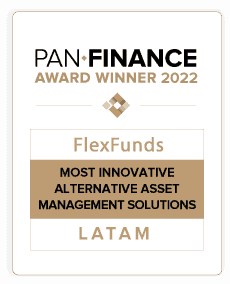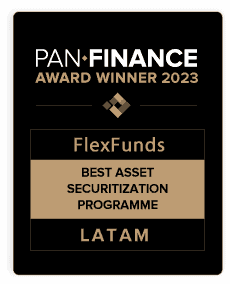- The article explains in detail what structured notes are, why they are important today and their main advantages.
- It is aimed at asset managers, investment advisors, and other market participants who want to understand the features of structured notes.
- At FlexFunds, we offer the possibility of securitizing financial instruments such as structured notes to enhance their liquidity. Contact us for more information!
Asset managers, advisors, entrepreneurs, investors, and other market participants seek to negotiate various financial options to overcome different challenges , including stock market volatility and economic fluctuations. Among the main options are structured notes.
What are structured notes?
Structured notes are hybrid financial instruments that combine features of both fixed-income and equity products, making them suitable for different profiles and allowing for higher returns than traditional products.
According to the U.S. Securities and Exchange Commission (SEC), structured notes are issued by financial institutions and then sold by intermediaries to investors looking to grow their wealth.
Structured notes are typically issued for a fixed term, usually with a minimum of one year, depending on the conditions set by each institution.
Since these instruments are tied to a specific basket of underlying assets, their holders earn returns based on the performance of these assets in the market. The linked assets can vary and may include stock market indices, exchange rates, corporate debt, and commodities, among others.
Advantages of structured notes
One of the main advantages of structured notes is that they allow investors to gain indirect exposure to more financial products and markets that they wouldn’t have access to under other circumstances, whether due to geographical limitations or the need for specific certifications to start generating returns from different types of assets.
At the same time, structured notes are considered flexible instruments because they can adapt to different market scenarios, achieving returns in both bullish and bearish contexts.
Moreover, these notes are developed according to each investor’s risk profile and are adjusted to the time horizon they set to meet their investment goals.
Thanks to their customizability, managers can establish key elements such as the terms, the basket of underlying assets to follow, the rates, protection percentages, and other relevant conditions.
Additionally, managers should consider that with structured notes, investors’ capital can be partially or fully shielded, as the structure includes fixed-income components that protect the money in case projections do not turn out as expected.
In this regard, Michael Collins, a finance professor at Endicott College, is very clear: “The structure of the note defines exactly how the return is calculated. These notes also include some form of protection against losses in case the underlying asset loses value.”
Aspects to consider when operating structured notes
When operating structured notes, it’s relevant to keep in mind that they carry a high degree of complexity and risk, so investors need to be familiar with fundamental concepts like how the payment structure works, associated fees, etc.
According to the SEC, another important aspect to consider about these investment vehicles is liquidity, as “the ability to trade or sell structured notes in a secondary market is often very limited.”
The SEC also refers to other important factors ranging from tax aspects, as their treatment can be considered complex, to specific issues like the market risk associated with a structured note, the issuance price, and more.
Structured notes are becoming increasingly popular
Structured notes have gained popularity among investors because they are an interesting alternative, adjusting to different profiles and offering potentially higher returns than fixed-income instruments.
Structured notes are especially prominent during times when volatility impacts stock markets and strategies focus more on preserving capital value without taking on too much risk in the face of global recession or crisis threats.
Their benefits are so significant to participants in the financial industry that, according to Envestnet data, the structured notes market is estimated to represent over USD 3 trillion in assets globally.
As with any type of investment, the key lies in thoroughly understanding the instrument before entering into it and seeking financial, legal, and tax advice to fully comply with all the responsibilities that come with structured notes as a non-traditional alternative.
Sources:
- https://www.sec.gov/oiea/investor-alerts-bulletins/ib_structurednotes
- https://www.envestnet.com/sites/default/files/2023-06/ENV-Structure-Notes-Pros-Cons-and-Risks.pdf
- https://www.forbes.com/advisor/investing/what-are-structured-notes







